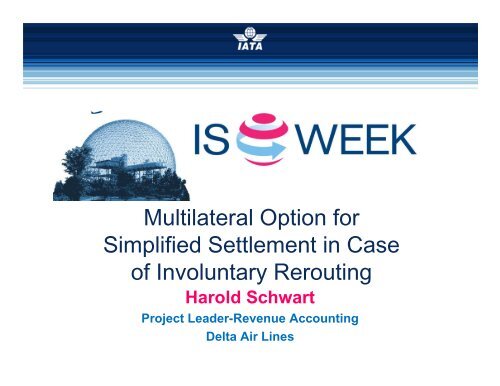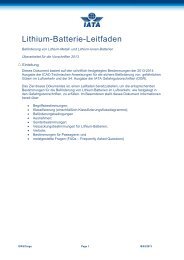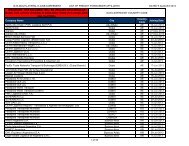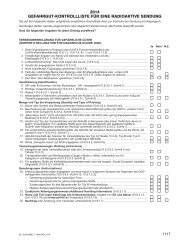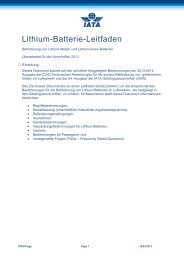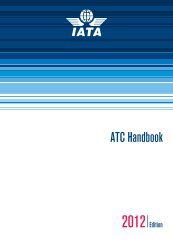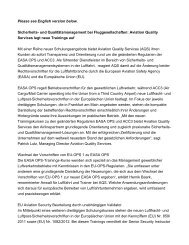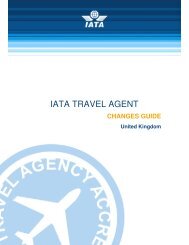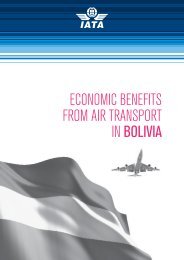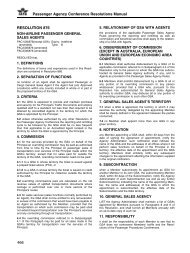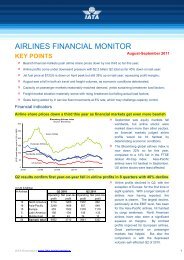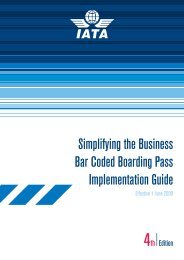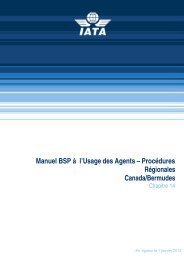SIS & RA Break-out Sessions - IATA
SIS & RA Break-out Sessions - IATA
SIS & RA Break-out Sessions - IATA
You also want an ePaper? Increase the reach of your titles
YUMPU automatically turns print PDFs into web optimized ePapers that Google loves.
Multilateral Option for<br />
Simplified Settlement in Case<br />
of Involuntary Rer<strong>out</strong>ing<br />
Harold Schwart<br />
Project Leader-Revenue Accounting<br />
Delta Air Lines
Background<br />
Many airlines expressed interest to simplify settlement in case of<br />
involuntary rer<strong>out</strong>ing at <strong>RA</strong>46<br />
The infrastructure using ATPCO, NFP, and ACH, as administrator,<br />
currently exists and is easily expanded for global reach<br />
ACH Participants have successfully employed this process for over 25<br />
years<br />
AA, AC, AS, DL, F9, UA and US have endorsed the concept and have<br />
committed to participation<br />
10 <strong>IATA</strong> airlines have reviewed test files earlier this year<br />
AC, AF, AS, DL, KE, KL, NZ, QF, OA, TK<br />
Draft of the Multilateral Agreement has been completed<br />
ACH Agreement extended to include international environment<br />
ISW2: Simplified Settlement in Case of<br />
Involuntary Rer<strong>out</strong>ing<br />
2
Objective<br />
<br />
<br />
<br />
<br />
<br />
Simplify the settlement process for involuntary rer<strong>out</strong>es<br />
Participation is voluntary<br />
Multilateral agreement, bilateral application<br />
Keep costs low<br />
Submission/authorization to use sales data is optional<br />
ISW2: Simplified Settlement in Case of<br />
Involuntary Rer<strong>out</strong>ing<br />
3
Benefits<br />
Supports intent of <strong>IATA</strong> Reso 735d and 735e<br />
Eliminates process to find and apply “applicable fare”<br />
Many airlines have stated involuntary rer<strong>out</strong>ing represents 30-50% of<br />
monthly rejection volumes<br />
Eliminates lengthy rejection/correspondence stages<br />
Reduces costs for interline audit<br />
Reduces prior period revenue adjustments<br />
Internal customers receive accurate flown revenue data<br />
Potential to replace/improve/simplify existing bilateral agreements<br />
Reduced rejections = reduced <strong>SIS</strong> transaction fees<br />
ISW2: Simplified Settlement in Case of<br />
Involuntary Rer<strong>out</strong>ing<br />
4
Process<br />
Daily ISR/TCN for participating airlines is filtered by ATPCO to<br />
eliminate:<br />
Non-passenger type tickets as instructed by airlines<br />
Zero fare tickets<br />
Infants and Child (based on ticket designator)<br />
Reissued tickets<br />
Non Revenue/Industry Discounted tickets (ID, AD, ZED)<br />
Filtered ISR/TCN file for each participating (issuing) airline is sent to<br />
Accelya (NFP) daily<br />
Authorization to submit sales in the process is voluntary and optional<br />
The file contains IT/BT/unpublished fares if fare field (FNUM) reflects a<br />
value >$0.00<br />
ISW2: Simplified Settlement in Case of<br />
Involuntary Rer<strong>out</strong>ing<br />
5
Process<br />
The NFP extracts 1% sample for proration based on <strong>IATA</strong> sample digit<br />
NFP prorates the sales<br />
MPA proration, including provisos, applies<br />
YQ/YR is excluded<br />
Normal MPA procedure shall apply to Q surcharges shown in the Fare<br />
Calculation Area<br />
Prorate results for each coupon are assigned to one of ten geographical<br />
regions based on the coupon’s geography<br />
ATBP: OSL-AMS-HKG-TYO<br />
OSL-AMS = Region Within TC2<br />
AMS-HKG = Region TC2-TC3<br />
HKG-TYO = Region Within TC3<br />
ISW2: Simplified Settlement in Case of<br />
Involuntary Rer<strong>out</strong>ing<br />
6
Process<br />
10 Regions are:<br />
Within North America<br />
Within TC 1 (Exc. North America)<br />
Between North America and TC1<br />
North America and S<strong>out</strong>hwest Pacific<br />
Transatlantic<br />
Within Area TC 2<br />
Transpacific<br />
Within TC 3<br />
Between TC 2 and TC 3<br />
Other<br />
Example:<br />
Ticket: LAX DEN F<strong>RA</strong><br />
LAX DEN – Within North America<br />
DEN F<strong>RA</strong> - Transatlantic<br />
ISW2: Simplified Settlement in Case of<br />
Involuntary Rer<strong>out</strong>ing<br />
7
Process<br />
The <strong>IATA</strong> Weighted Mileage Factor is determined based on the O&D of<br />
the each coupon<br />
The sum of all prorate values are compared to the sum of all Factors,<br />
by issuing airline, for each geographical region to derive a % of prorate<br />
value to Factor<br />
Airlines with less than 50 transactions in the geographical region are<br />
excluded from the calculation<br />
ISW2: Simplified Settlement in Case of<br />
Involuntary Rer<strong>out</strong>ing<br />
8
Process – Results by Region<br />
Survey<br />
Participant<br />
No. of<br />
Coupons<br />
Original Segment Coupon Values<br />
of WM Coupons (in USD)<br />
Segment Weighted<br />
Mileage Factors<br />
Rate (%)<br />
Prorate/WMF<br />
AC 804 131,155.64 1,317,886 9.95%<br />
AF 28,880 4,786,491.00 36,979,833 12.94%<br />
DL 3,285 537,293.37 5,615,687 9.57%<br />
KE 10 991.03 9,342<br />
KL 14,746 1,779,510.88 19,438,279 9.15%<br />
NZ 30 4,640.19 53,157<br />
OA 376 26,160.77 213,275 12.27%<br />
QF 398 121,558.62 1,287,644 9.44%<br />
TK 14,168 1,909,295.88 24,010,600 7.95%<br />
Total 9,291,466<br />
Excluded due less than 50 coupons<br />
88,863,204 10.45%<br />
ISW2: Simplified Settlement in Case of<br />
Involuntary Rer<strong>out</strong>ing<br />
9
Process – Summary of Rates<br />
Inv<br />
Month<br />
Within<br />
NA<br />
Within<br />
TC 1<br />
Excl NA<br />
NA-TC1<br />
NA-<br />
SWP<br />
TA<br />
Within<br />
TC2<br />
TC1-<br />
TC3<br />
Excl<br />
SWP<br />
Within<br />
TC3<br />
TC2-TC3<br />
Other<br />
Apr-14 12% 13% 14% 15% 15% 10% 9% 8% 7% 6%<br />
May-14<br />
Note: Rates noted above are for display purposes only<br />
ISW2: Simplified Settlement in Case of<br />
Involuntary Rer<strong>out</strong>ing<br />
10
Process<br />
The resulting % of the <strong>IATA</strong> Weighted Mileage Factor is the rate to be<br />
applied in the following month for interline settlement<br />
March sales will determine rate applicable to May transactions<br />
Rates are rounded: 10.45% rounded to 10% for application<br />
Rates are distributed to multilateral participants no later than the 15 th of<br />
each month for application the following month<br />
Published to website is envisioned<br />
Prorate files are available upon request but only for your ticket stock<br />
ISW2: Simplified Settlement in Case of<br />
Involuntary Rer<strong>out</strong>ing<br />
11
How to Apply Internally<br />
<br />
<br />
<br />
<br />
<br />
<br />
Prorate systems will be coded similar to SPAs to apply rates for each<br />
region<br />
Prorates are calculated on your ticket stock with sector on<br />
participating other airline<br />
Prorates are calculated for participating other airline ticket stock with<br />
sector on your airline<br />
Rates are updated monthly<br />
Applicable rate is determined based on ticket issue date<br />
For FIMs the applicable rate is determined based on invoice month<br />
ISW2: Simplified Settlement in Case of<br />
Involuntary Rer<strong>out</strong>ing<br />
12
How to Apply Internally<br />
Process applies to tickets issued in accordance with <strong>IATA</strong> Reso 735d<br />
(involuntary rer<strong>out</strong>ing) and to FIMs issued in accordance with Reso<br />
735e<br />
The process provides prorate value only. TFCs and ISC are applicable<br />
in accordance with standard industry procedures<br />
The rate x Weighted Mileage Factor (prorate factor) = the prorate value<br />
to be settled<br />
The settlement value is not discounted for passenger type<br />
In case of FIMs the settlement rate applies per passenger<br />
Bilateral settlement agreements will supersede this agreement and<br />
should be considered when coding your system<br />
ISW2: Simplified Settlement in Case of<br />
Involuntary Rer<strong>out</strong>ing<br />
13
Getting Started<br />
Review the Agreement<br />
Partner with your Commercial team<br />
Identify and engage your partners for greatest benefit with simplification<br />
Compare participating carriers to your interline volumes<br />
Express your interest to <strong>IATA</strong> Mgr. <strong>RA</strong> and ACH<br />
Determine if you will supply sales data<br />
Code and test your prorate system<br />
Run parallel vs. in-house results<br />
Determine your start date and sign participation agreement<br />
ISW2: Simplified Settlement in Case of<br />
Involuntary Rer<strong>out</strong>ing<br />
14
Dates to Remember<br />
Launch Dates<br />
January 1, 2014 – may sign the Multilateral Agreement<br />
April 1, 2014 – may authorize ISR data (sales) to be used<br />
June 1, 2014 – may enter into concurrence with other parties<br />
ISW2: Meeting and Name of Presentation<br />
15
Questions<br />
ISW2: Simplified Settlement in Case of<br />
Involuntary Rer<strong>out</strong>ing<br />
16
Thank you for your Participation!<br />
Harold Schwart<br />
Harold.Schwart@delta.com<br />
delaneyt@iata.org<br />
Ltully@airlines.org<br />
ISW2: Meeting and Name of Presentation<br />
17
<strong>IATA</strong>/ATPCO Monthly TTBS<br />
The Future of Tax Billings<br />
Antoinette Nelson<br />
David Smith<br />
Air New Zealand<br />
ATPCO
Interline Billing of TFCs<br />
(Taxes, Fees, Charges,<br />
Commonly referred to as “Taxes”)<br />
<strong>RA</strong>TD<br />
(Revenue Accounting Tax Database)<br />
or<br />
TTBS<br />
(Ticket Tax Box Service)<br />
ISW2: <strong>IATA</strong>/ATPCO Monthly TTBS<br />
19
Business Schedule<br />
Part 1:<br />
How did we get to where we are today?<br />
Part 2:<br />
Solution for the future<br />
ISW2: <strong>IATA</strong>/ATPCO Monthly TTBS<br />
20
Background<br />
<strong>RA</strong> Vision Group Project<br />
Mandate: To simplify interline tax billings<br />
2003 <strong>RA</strong>TD was introduced<br />
Extract from TTBS<br />
Database for interlineable taxes only<br />
ISW2: <strong>IATA</strong>/ATPCO Monthly TTBS<br />
21
Simplifications in the <strong>RA</strong>TD<br />
Single Source for Interline Tax Billings<br />
Only contains Interlineable Taxes<br />
“Access” format online<br />
Downloadable XML format<br />
ISW2: <strong>IATA</strong>/ATPCO Monthly TTBS<br />
22
Advantages<br />
Simple determination of tax amount to be billed<br />
Single amount for a given sector/class<br />
No carrier-specific taxes<br />
Differences on same tax for different airlines were minimal and acceptable<br />
No carrier exemptions<br />
ISW2: <strong>IATA</strong>/ATPCO Monthly TTBS<br />
23
Disadvantages<br />
Access database mainly useful for manual determination of billable<br />
taxes<br />
XML database contains too much free text for auto downloading<br />
Costly for <strong>IATA</strong> to maintain two separate databases<br />
ISW2: <strong>IATA</strong>/ATPCO Monthly TTBS<br />
24
…as time went on…<br />
TFC filings became “creative” and complex<br />
More and more “undeterminable” taxes<br />
Passport holders of a certain country<br />
Children up to the age of 14, infants up to the age of 4<br />
Visiting heads of government<br />
Passengers remaining airside<br />
Airline staff travelling in uniform<br />
Etc.<br />
ISW2: <strong>IATA</strong>/ATPCO Monthly TTBS<br />
25
…as time went on…<br />
Carrier-specific tax amounts started to vary significantly between<br />
carriers in some markets<br />
Carrier conditions and exemptions included in comment field<br />
<strong>IATA</strong> tax filing criteria was relaxed<br />
ISW2: <strong>IATA</strong>/ATPCO Monthly TTBS<br />
26
What’s the situation?<br />
Tickets priced based on TTBS<br />
Interline bills based on summarized and simplified monthly file, the<br />
<strong>RA</strong>TD<br />
This results in settlement not matching the taxes collected<br />
Higher manual processing costs<br />
Lack of automated data<br />
Significant revenue impact for some airlines purely based on location<br />
ISW2: <strong>IATA</strong>/ATPCO Monthly TTBS<br />
27
Problems: “Undeterminable” Taxes<br />
Additional manual work by airlines to determine why the ticketed<br />
amount was different from the billed amount<br />
Mainly manual decision what the correct TFC amount is<br />
Default TFC application<br />
Depending on carrier’s interpretation<br />
ISW2: <strong>IATA</strong>/ATPCO Monthly TTBS<br />
28
Problems: Carrier Exceptions<br />
Carrier Exceptions<br />
Lack of automated data<br />
Shown in “Comment” field<br />
Filed by government authorities<br />
Filed by airlines<br />
Filed by authorities<br />
ISW2: <strong>IATA</strong>/ATPCO Monthly TTBS<br />
29
Problems: Carrier-Specific Taxes<br />
High revenue impact<br />
Gap between TFCs collected and official amounts widens<br />
Official amount is billed, irrespective of amount collected<br />
Always the same carrier absorbs loss or gain<br />
ISW2: <strong>IATA</strong>/ATPCO Monthly TTBS<br />
30
Problems: Carrier-Specific Taxes<br />
Example: Under Collection<br />
Carrier-Specific TFC<br />
collected on ticket<br />
Official Amount in<br />
<strong>RA</strong>TD Billed by the<br />
uplifting carrier<br />
Loss to ticketing<br />
airline<br />
$ 7.75 $15.23 $7.48<br />
One carrier lost USD 78,000/year on one TFC code alone!<br />
Geographic location can mean that certain carriers are always<br />
disadvantaged as the first international, and therefore generally the<br />
ticketing, carrier<br />
ISW2: <strong>IATA</strong>/ATPCO Monthly TTBS<br />
31
Problems: Carrier-Specific Taxes<br />
Example: Over Collection<br />
Official Amount in<br />
Carrier Specific TFC<br />
Loss to uplifting<br />
<strong>RA</strong>TD Billed by the<br />
collected on ticket<br />
carrier<br />
uplifting carrier<br />
Tax authorities<br />
$ 12.00<br />
require the<br />
$9.80<br />
correct amount to be<br />
$2.20<br />
paid<br />
ISW2: <strong>IATA</strong>/ATPCO Monthly TTBS<br />
32
The <strong>RA</strong>TD: the story so far<br />
Various papers submitted to the <strong>RA</strong> over the years:<br />
<strong>RA</strong> 43 – Ignore Carrier information in Comment Field<br />
Passed<br />
<strong>RA</strong> 44 – Allow Carrier Exemptions in <strong>RA</strong>TD<br />
Passed<br />
Only selected exemptions authorized in published legislation can be included in the <strong>RA</strong>TD, exemption<br />
code CE<br />
ISW2: <strong>IATA</strong>/ATPCO Monthly TTBS<br />
33
The <strong>RA</strong>TD: the story so far<br />
Various papers submitted to the <strong>RA</strong><br />
<strong>RA</strong> 44 – Include Carrier-Specific TFCs in <strong>RA</strong>TD<br />
Failed<br />
<strong>RA</strong> 46 – Again Proposal to include Carrier-Specific TFCs in <strong>RA</strong>TD<br />
Failed narrowly<br />
ISW2: <strong>IATA</strong>/ATPCO Monthly TTBS<br />
34
The TTBS: The story so far<br />
<strong>IATA</strong> TTBS<br />
Repository for government and taxing authority taxes, fees, and charges<br />
After August 2014, no further carrier exceptions will be included<br />
Changing focus for TTBS<br />
Itinerary taxes, Official amounts, Cleaner<br />
<strong>IATA</strong>/ATPCO Tax Product Strengths<br />
<strong>IATA</strong>’s tax governance and provision of TTBS<br />
ATPCO’s data application and provision of cleaner, more automated data<br />
Launched in 2010<br />
All TTBS data for taxes<br />
Carrier exceptions instructed directly to ATPCO<br />
Economies of scale for distributing Service Fee tax information<br />
Consistency across all systems and all processes<br />
ISW2: <strong>IATA</strong>/ATPCO Monthly TTBS<br />
35
Tax Working Group<br />
Representatives from<br />
OZ<br />
Kyeong Seo Kim (1 st Chair), So Young Choi, Ji Yeon Kim<br />
NZ<br />
Antoinette Nelson (2 nd Chair)<br />
EK<br />
Shankar Shanbhog<br />
KL<br />
Frans van Schie, Nick Westerveld, Robert Lieverse<br />
QF<br />
Stefanus Ari, Ian Alfred<br />
S7<br />
Alexei Kalashnikov, Ekaterina Koroleva, Ekaterina Osipenko<br />
<strong>IATA</strong> David McEwen, Terry Delaney<br />
ATPCO David Smith, Ginnette Harmon<br />
ISW2: <strong>IATA</strong>/ATPCO Monthly TTBS<br />
36
Approach<br />
Initial Approach<br />
Establish new <strong>RA</strong>TD incorporating carrier-specific taxes<br />
Design fully automated and downloadable TFC Billing Database<br />
Light bulb moment<br />
Use a version of monthly TTBS (all exemptions and carrier exceptions) for<br />
TFC billings<br />
ISW2: <strong>IATA</strong>/ATPCO Monthly TTBS<br />
37
Meeting at ATPCO<br />
Explained issues carriers experience with the current <strong>RA</strong>TD<br />
ATPCO introduced the new tax product they created with <strong>IATA</strong><br />
Suitability of this product for Revenue Accounting<br />
One database for both sales and billing<br />
ISW2: <strong>IATA</strong>/ATPCO Monthly TTBS<br />
38
. . . and . . .<br />
ISW2: <strong>IATA</strong>/ATPCO Monthly TTBS<br />
39
We have a new<br />
PROPOSAL PAPER...<br />
ISW2: <strong>IATA</strong>/ATPCO Monthly TTBS<br />
40
Using simplified tax data<br />
was necessary, but<br />
more airline exceptions<br />
and complex tax rules<br />
cause airlines to<br />
lose revenue
Envisaged Solution<br />
<strong>IATA</strong>/ATPCO Monthly TTBS<br />
Fully automated data with text version<br />
Managed by <strong>IATA</strong>, ATPCO, and an airline working group<br />
Data application<br />
Implementation<br />
Communication<br />
ISW2: <strong>IATA</strong>/ATPCO Monthly TTBS<br />
42
<strong>IATA</strong>/ATPCO Monthly TTBS<br />
Revenue accounting data based on comprehensive tax information<br />
All carrier exceptions<br />
All pricing exemptions instructed by governments<br />
Monthly snapshot for ease of revenue accounting interline processing<br />
Subscriptions file sent monthly for systems<br />
Manual version distributed to support non-automated processes<br />
Reconciliation to automated pricing data (same source)<br />
Not implemented until 1 March 2015 to give systems and airlines time<br />
to work through the changes<br />
ISW2: <strong>IATA</strong>/ATPCO Monthly TTBS<br />
43
<strong>IATA</strong>/ATPCO Monthly TTBS<br />
<strong>IATA</strong><br />
TTBS<br />
<strong>IATA</strong> validated<br />
official<br />
amounts<br />
ATPCO<br />
Taxes<br />
<strong>IATA</strong>/ATPCO<br />
Monthly<br />
TTBS<br />
Interline Billing and<br />
Audit Systems<br />
Shopping Systems<br />
Carrier<br />
specified<br />
amounts and<br />
exceptions<br />
Sales Audit Systems<br />
Pricing Systems<br />
ISW2: <strong>IATA</strong>/ATPCO Monthly TTBS<br />
44
Pros<br />
Cons<br />
<br />
Removes revenue impact of<br />
Exemptions used in pricing not<br />
being used in revenue accounting<br />
Different rates used for settlement<br />
and pricing<br />
<br />
<strong>RA</strong> systems will need to be<br />
enhanced to handle automated<br />
feeds of multiple tax rates and<br />
more exemptions<br />
<br />
Reduces manual costs<br />
<br />
Speedy development by reusing the<br />
best of existing formats from ATPCO<br />
and <strong>IATA</strong><br />
<br />
Fully automated process comes from a<br />
100% data-driven solution<br />
ISW2: <strong>IATA</strong>/ATPCO Monthly TTBS<br />
45
In Summary<br />
<strong>IATA</strong>/ATPCO Monthly TTBS will be the single source<br />
Eliminates discrepancies<br />
Two formats: automated and manually readable<br />
All carrier exceptions and all exemptions used in pricing<br />
Implementation (1 March 2015)<br />
The <strong>RA</strong>TD will be retired<br />
Systems will need to be ready to process the new data<br />
ISW2: <strong>IATA</strong>/ATPCO Monthly TTBS<br />
46
Related news items for thoughts<br />
Taxes on services for interline billing<br />
<strong>IATA</strong> migration of carrier specified amounts to ATPCO<br />
ISW2: <strong>IATA</strong>/ATPCO Monthly TTBS<br />
47
Please consider voting for<br />
<strong>IATA</strong>/ATPCO Monthly TTBS<br />
at the General Meeting<br />
Agenda item P2<br />
ISW2: <strong>IATA</strong>/ATPCO Monthly TTBS<br />
48
Thank you to our coffee<br />
break Sponsor
Improvement Opportunities in<br />
Interline Billing and<br />
Settlement<br />
Matt Holden<br />
<strong>RA</strong>WG
Last year we discussed<br />
<strong>SIS</strong> billings rejected <strong>out</strong>side <strong>SIS</strong><br />
Habitual billing at default full fare<br />
Incorrect migration of billings into <strong>SIS</strong><br />
Bills <strong>out</strong>side time limits with<strong>out</strong> prior consent<br />
Lazy rejection texts<br />
"..reject prorate difference“
<strong>SIS</strong> billings rejected <strong>out</strong>side <strong>SIS</strong><br />
ICH closed to non-<strong>SIS</strong> debits in April 2013<br />
Habitual billing at default full fare<br />
Observe <strong>RA</strong>M A2 1.1.1 and A2 3<br />
Many systems can automate this<br />
Existing rules are clear, <strong>SIS</strong> does not play a role<br />
Use E-ticket data to identify fare and value<br />
Communicate – consider SPA
Incorrect migration of billings into <strong>SIS</strong><br />
Since Mar-P4 2013 <strong>SIS</strong> offers optional validations<br />
% of invoices failing validation:<br />
April 2013 – 9.91% June 2013 – 7.87%<br />
Bills <strong>out</strong>side time limits with<strong>out</strong> prior consent<br />
Time limits are detailed in <strong>RA</strong>M A10 5.1<br />
Use IS-validation flags and reason code 2D
Lazy rejection texts "..reject prorate difference”<br />
Last year we discussed:<br />
Satisfy <strong>RA</strong>M A10 paragraph 2.3<br />
Use SFI 43 <strong>SIS</strong> Prorate Slip, use supporting documents<br />
Use <strong>SIS</strong> Rejection Reason codes<br />
Tell the carrier what they have done….. Educate them<br />
Guaranteed to get you a rejection right back.
Lazy rejection texts "..reject prorate difference" cont…<br />
The Prorate slip is available to all carriers. Its use should be<br />
promoted<br />
Billing Month RM Count RM Prorate Slip Count Prorate Slip %<br />
Aug ’12 845,329 435,647 52%<br />
Sep ’12 993,754 544,801 55%<br />
Oct ’12 939,382 488,452 52%<br />
Nov ’12 983,715 544,910 55%<br />
Dec’12 899,001 454,347 51%<br />
Jan ’13 1,024,279 487,783 48%<br />
Feb ’13 940,037 460,637 49%<br />
Mar ’13 998,689 484,780 49%<br />
Apr ’13 1,010,902 502,402 50%<br />
May ’13 1,057,149 513,645 49%<br />
Jun ’13 1,038,012 459,824 44%<br />
Jul ’13 1,028,560 454,008 44%<br />
Total 11,758,809 5,831,236 50%
Lazy rejection texts "..reject prorate difference" cont…<br />
The Prorate slip is easy to find in<br />
all rejection memo coupon<br />
breakdowns
Lazy rejection texts "..reject prorate difference" cont…<br />
The acceptable standard is in <strong>RA</strong>M A10 2.3 – particularly 2 nd & 3 rd stage<br />
Prorate slip uses “system friendly” 80 characters width.<br />
Can “Paste” into IS-Web pop-up or create an SFI 43 file.<br />
Reduces risk of a rejection back to you.<br />
Look in ISPG 9.2.1 page 191 for example and details<br />
Asking for ticket image at 2 nd stage rejection – billing carrier has full E-tkt<br />
details
New practices seen in 2013<br />
Abuse of the Billing Memo<br />
The billing memo is a specific means of billing only:<br />
<br />
<br />
Bilaterally agreed items, or:<br />
Items permitted by <strong>RA</strong>M but not prime coupon billing nor rejections against<br />
prime billings
Abuse of the Billing Memo<br />
Examples...<br />
Carriers break the audit trail with a BM<br />
Carriers attach non-<strong>SIS</strong> invoice/scan to a BM<br />
BM contains no remarks, attachment or coupon records<br />
Over-use of 8Z (avoiding coupon records)<br />
Carriers use reason code 8Z when a 6A/B is required<br />
Carriers reject 6A and 6B billings with another billing<br />
memo
Abuse of the Billing Memo<br />
Examples cont...<br />
Carriers use BM’s for bulk rejection “get-around” A10 4.1.2<br />
Carriers unwilling to populate SC44 FIM coupon breakdowns<br />
Original billing purged from <strong>SIS</strong>, so carrier rejects with BM<br />
Form C deadline missed, so carrier sends a BM<br />
All cause great disruption to carrier receiving the BM
New practices seen in 2013<br />
Insufficient/wrong contact details filed in <strong>SIS</strong> Member Profile<br />
<br />
<br />
Old/discontinued Email addresses filed<br />
Contacts filed, but no helpful info on role/department<br />
Visit the <strong>SIS</strong> Operations desk in the foyer…. Check and confirm<br />
your airline details are correct – Prize Draw!
New practices seen in 2013<br />
Recognising who a correspondence item is to/from<br />
<br />
“01250000001 - SPA Issue”<br />
….is better if named:<br />
“01250000001 – BA initiated to AA: SPA Issue”<br />
<br />
A technical solution is not necessary
New practices seen in 2013<br />
Abuse of <strong>RA</strong>M A10 5.2.1.5 and 5.3<br />
<br />
<br />
5.2.1.5 “…. Correspondence may be initiated only if the total value in<br />
dispute is USD 50.00 or more….”<br />
5.3 “Both the carrying airline A and the issuing airline B are entitled to<br />
increase or decrease their previous evaluations during any<br />
rejection/correspondence stage….”<br />
Airlines are mis-using 5.3 in order to circumvent 5.2.1.5<br />
An amendment to 5.3 and IS-Web may be tabled if abuse continues
So, in summary…<br />
<br />
<br />
<br />
<strong>SIS</strong> is still a new way of doing business.<br />
Some naivety, learning, maturity needed by users<br />
New <strong>SIS</strong> validations are there to help<br />
<br />
<br />
….but emphasis remains on playing your part correctly<br />
Too many behaviours and billings are ignoring the <strong>RA</strong>M
And Finally…<br />
Bill right first time. Best<br />
practice saves everyone<br />
time and money
Thank you for your Participation!<br />
Matt Holden<br />
Matthew.holden@ba.com
<strong>SIS</strong> and <strong>RA</strong>M Rules<br />
<strong>SIS</strong> and <strong>RA</strong>M Rules<br />
Kirk Pereira & Valentina Pisapia<br />
<strong>SIS</strong> Operations<br />
ISW2: <strong>SIS</strong> and <strong>RA</strong>M Rules<br />
67
Background<br />
During the past 2 years we had numerous queries on<br />
<strong>SIS</strong> in relation to <strong>RA</strong>M rules<br />
How Why Can are did I grant duplicate <strong>SIS</strong> time not stop limit billings an extensions airline handled billing in in <strong>SIS</strong>?<br />
me<br />
a FIM in a wrong source code?<br />
ISW2: <strong>SIS</strong> and <strong>RA</strong>M Rules<br />
68
Agenda<br />
Todays session covers<br />
Some of the <strong>RA</strong>M rules that are in <strong>SIS</strong><br />
Your inputs on <strong>SIS</strong> and <strong>RA</strong>M<br />
We will cover<br />
how the rules<br />
work in <strong>SIS</strong><br />
We will take<br />
your inputs and<br />
pass it on to the<br />
WG’s<br />
ISW2: <strong>SIS</strong> and <strong>RA</strong>M Rules<br />
69
But before we start<br />
A couple of points to always remember<br />
Should there be any conflict between the contents of<br />
the ISPG and any rule in the <strong>RA</strong>M, the <strong>RA</strong>M rule in<br />
question shall prevail<br />
However should there be a conflict between the <strong>RA</strong>M<br />
and the <strong>IATA</strong> Resolution, the Resolution shall prevail<br />
ISW2: <strong>SIS</strong> and <strong>RA</strong>M Rules<br />
70
<strong>RA</strong>M rules existing in<br />
<strong>SIS</strong><br />
ISW2: <strong>SIS</strong> and <strong>RA</strong>M Rules<br />
71
Time Limits for Billing and Rejections<br />
<strong>RA</strong>M CH A10. Para 5 defines<br />
the timelines when a<br />
Passenger or Cargo<br />
transaction in <strong>SIS</strong> can be<br />
billed or rejected<br />
These timelines are<br />
validated in <strong>SIS</strong>. However<br />
<strong>SIS</strong> does not stop the billing<br />
of the transaction, but flags<br />
it in the IS-IDEC / IS-XML to<br />
the billed carrier - that this<br />
transaction has been billed<br />
<strong>out</strong>side the <strong>RA</strong>M time limit<br />
ISW2: <strong>SIS</strong> and <strong>RA</strong>M Rules<br />
72
So can I ask for a time limit extension?<br />
Yes. In exceptional cases please request your Interline partner<br />
NOTE that due to the purging policy of <strong>SIS</strong> the transactions are kept<br />
only for 2 more additional months from the time limit specified in the<br />
<strong>RA</strong>M<br />
Once a transaction for a fully migrated member has been purged it will<br />
not allow it to be rejected or rebilled through the normal process<br />
The only option is to raise a Billing Memo with reason code<br />
‘8M - Outside Time limit billings’<br />
ISW2: <strong>SIS</strong> and <strong>RA</strong>M Rules<br />
73
Q1 - <strong>RA</strong>M CH A10 para 5<br />
We will take<br />
your Feedback<br />
to <strong>RA</strong>WG<br />
PAX and Cargo rejections currently have a time limit of 6 months<br />
With all processing now electronic in <strong>SIS</strong>, do you think it is time to reduce<br />
these deadlines?<br />
No, I think this is right. No change required<br />
Yes, I think it is too long. It should be …..<br />
I think it is too short. It should be ….<br />
N/A<br />
ISW2: <strong>SIS</strong> and <strong>RA</strong>M Rules<br />
74
Q2 - <strong>RA</strong>M CH A13 para 4.4<br />
We will take your<br />
Feedback to E-<br />
Invoicing WG<br />
For Misc category as well, the time limit for raising a rejection is 6 months<br />
Do you think it’s time to reduce the time limits for MISC?<br />
No, I think this is right. No change required<br />
Yes, I think it is too long. It should be …..<br />
N/A<br />
ISW2: <strong>SIS</strong> and <strong>RA</strong>M Rules<br />
75
Time Limit for Correspondence<br />
<strong>RA</strong>M CH A10. 5 defines the<br />
timelines when a Passenger<br />
or Cargo correspondence<br />
can be initiated or<br />
responded to in <strong>SIS</strong><br />
<strong>RA</strong>M A13. 4.5 is for<br />
Miscellaneous<br />
correspondence<br />
These timelines are<br />
enforced in <strong>SIS</strong>. If a carrier<br />
does not respond within<br />
these time lines then <strong>SIS</strong><br />
expires the correspondence<br />
and the member is unable to<br />
re-open it<br />
ISW2: <strong>SIS</strong> and <strong>RA</strong>M Rules<br />
76
Extension for Correspondence?<br />
For Correspondence <strong>SIS</strong> does not permit extension of time limit<br />
Workaround: If both carriers agree – settle the dispute via email<br />
and the resulting billing memo can be raised in <strong>SIS</strong> using a<br />
reason code both parties agrees to.<br />
Note - Complete audit trail for the transaction will be missing in<br />
<strong>SIS</strong><br />
ISW2: <strong>SIS</strong> and <strong>RA</strong>M Rules<br />
77
Duplicate Billings for same coupon<br />
<strong>RA</strong>M CH A3 Para 4 gives<br />
details on handling of<br />
multiple billings for a<br />
coupon<br />
<strong>SIS</strong> flags duplicate billings<br />
for coupons billed twice<br />
within the same invoice or in<br />
a previous invoice for the<br />
same billing / billed<br />
combination<br />
<strong>SIS</strong> does not flag a coupon<br />
as duplicate when billed by<br />
two different carriers<br />
ISW2: <strong>SIS</strong> and <strong>RA</strong>M Rules<br />
78
How does <strong>SIS</strong> identify duplicates? 1/2<br />
Prime Coupons - Any transaction that has been billed twice to the<br />
same billing /billed carrier pair. This check is performed for invoices<br />
billed in the last 12 calendar months<br />
Exception: Sampling UAF re-billings under source code 27<br />
Exception: Billing Memos for Supplementary billings<br />
Any duplicate identified is indicated in the <strong>out</strong>bound IS-IDEC / IS-XML<br />
file from <strong>SIS</strong> to the billed member<br />
ISW2: <strong>SIS</strong> and <strong>RA</strong>M Rules<br />
79
How does <strong>SIS</strong> identify duplicates? 2/2<br />
Rejection Memos - Any coupon belonging to more than one rejection<br />
chain will be considered as a duplicate.<br />
This check is performed for invoices in the last 12 calendar months<br />
ISW2: <strong>SIS</strong> and <strong>RA</strong>M Rules<br />
80
Q3 – Duplicate checks<br />
Feedback to<br />
<strong>RA</strong>WG<br />
Currently <strong>SIS</strong> flags duplicate coupons. Do you think <strong>SIS</strong> should error <strong>out</strong><br />
these coupons?<br />
No, I think the system should continue to just flag it<br />
Yes, I think it would be better if <strong>SIS</strong> does not allow<br />
duplicate billings<br />
N/A<br />
ISW2: <strong>SIS</strong> and <strong>RA</strong>M Rules<br />
81
PAX Supplementary charges<br />
<strong>RA</strong>M CH A2 Para 1.12 allows<br />
for supplementary charges<br />
to be raised against an item<br />
previously billed if the error<br />
value exceeds USD200 per<br />
individual coupon<br />
Supplementary charges<br />
should be billed via a Billing<br />
memo with reason code ‘8E’<br />
ISW2: <strong>SIS</strong> and <strong>RA</strong>M Rules<br />
82
PAX- rejections – Clubbing of coupons<br />
<strong>RA</strong>M CH A10 4.1.3 - Talks<br />
ab<strong>out</strong> clubbing of coupons<br />
in a rejection<br />
Q4) While <strong>SIS</strong> allows<br />
rejections to be clubbed do<br />
you feel we should be<br />
moving to only 1 coupon per<br />
rejection?<br />
Yes, easier to process.<br />
No, let it be as it is<br />
N/A<br />
ISW2: <strong>SIS</strong> and <strong>RA</strong>M Rules<br />
83
Q5 – <strong>Break</strong>down Records<br />
Feedback to<br />
<strong>RA</strong>WG/<strong>SIS</strong> SG<br />
Currently in <strong>SIS</strong>, it is possible to create rejections with<strong>out</strong> coupons/<br />
AWBs breakdown using reason code “Others”. Should breakdown<br />
records be mandatory?<br />
Yes, I think it would be better to make breakdowns<br />
mandatory for all reason codes<br />
No, Don’t make a change. We have scenarios where we<br />
cannot provide breakdown records. Please share it:<br />
_______________________________________________<br />
_______________________________________________<br />
N/A<br />
ISW2: <strong>SIS</strong> and <strong>RA</strong>M Rules<br />
84
PAX- Source codes<br />
<strong>RA</strong>M CH A9 Attachment G<br />
lists the source code<br />
applicable for Passenger<br />
transactions<br />
While <strong>SIS</strong> invoice structure<br />
follows the <strong>RA</strong>M for listing<br />
of source codes, it does not<br />
validate the document<br />
series of the coupons<br />
Example: <strong>SIS</strong> will not check<br />
whether a FIM / EBT<br />
document number has been<br />
billed under source code 1<br />
ISW2: <strong>SIS</strong> and <strong>RA</strong>M Rules<br />
85
Bilateral source codes<br />
<strong>SIS</strong> does not validate whether you and your interline partners have a<br />
bilateral agreement to bill bilateral source codes, example, for<br />
Frequent Flyer billings<br />
Please check with your interline partner before using bilateral source<br />
codes<br />
ISW2: <strong>SIS</strong> and <strong>RA</strong>M Rules<br />
86
Invoices and Credit notes 1/2<br />
<strong>RA</strong>M CH A9 Para 3.1.1 - For<br />
all transactions, invoices<br />
and credit notes shall<br />
contain a serial reference<br />
number. Such number shall<br />
be 10 Alpha/Numeric, and<br />
must be unique within a<br />
calendar year<br />
<strong>SIS</strong> requires all invoices to<br />
be maximum 10<br />
Alpha/numeric and be<br />
unique across all billing<br />
categories within a calendar<br />
year<br />
Note: Invoice ‘ABCDE’ and<br />
invoice ‘abcde’ are<br />
considered duplicates<br />
ISW2: <strong>SIS</strong> and <strong>RA</strong>M Rules<br />
87
Invoices and Credit notes 2/2<br />
<strong>RA</strong>M CH A9 Para 3.3 point b<br />
– Invoices and Credit notes<br />
cannot be prepared earlier<br />
than the <strong>IATA</strong> billing period<br />
within which the transaction<br />
was performed<br />
<strong>SIS</strong> has implemented a<br />
validation to ensure that<br />
PAX prime coupons are not<br />
billed earlier than the<br />
current open period.<br />
Example: A flight coupon<br />
uplifted on 5 th August 2013<br />
cannot be billed before 8 th<br />
August (August P1 opens)<br />
ISW2: <strong>SIS</strong> and <strong>RA</strong>M Rules<br />
88
Q6 - <strong>RA</strong>M CH A10 3.1<br />
Minimum Value for PAX and Cargo Rejections:<br />
Except in the case of persistent errors, the minimum value for the first or<br />
subsequent rejection of passenger and cargo transactions shall be USD 5,<br />
or for tax billings USD 2, or the equivalent using the same exchange rate<br />
as used in the original billing. The USD 5 amount mentioned above is<br />
before deduction of Interline Service Charge (gross).<br />
Do you feel that the minimum value should move towards the net amount<br />
rejected?<br />
No, I think current amounts are ok<br />
Yes, I think it should be on net amount<br />
I have another option (please enter it below)<br />
_____________________________________________<br />
N/A<br />
Feedback to<br />
<strong>RA</strong>WG<br />
ISW2: <strong>SIS</strong> and <strong>RA</strong>M Rules<br />
89
Q7 - <strong>RA</strong>M CH A13 2.2<br />
Feedback to<br />
E-Invoicing WG<br />
Minimum Value for Misc invoices:<br />
Invoices should not be issued for less than USD25, however<br />
multiple items of less than the minimum value each may be<br />
combined on a single invoice totaling USD25 or more, provided that<br />
they all have the same Charge Category.<br />
Do you feel the Minimum value for Misc invoices is fine?<br />
Yes, I think USD25 is right<br />
No, I think USD25 is too low. I think it should be …..<br />
No, I think USD25 is too high. I think it should be ….<br />
N/A<br />
ISW2: <strong>SIS</strong> and <strong>RA</strong>M Rules<br />
90
Thank you for your Participation!<br />
Email:<br />
sisoperations@iata.org<br />
<strong>SIS</strong> Website:<br />
www.iata.org/sis<br />
ISW2: <strong>SIS</strong> and <strong>RA</strong>M Rules<br />
91
LUNCH<br />
Hochelaga 1
<strong>SIS</strong> Release Management<br />
<strong>Break</strong><strong>out</strong> Session<br />
Paula FEINBERG<br />
Test Manager, <strong>SIS</strong> Operations<br />
Thierry CERPOLET<br />
Product Manager, Web Access Services<br />
93<br />
11 October 2010<br />
93
Agenda<br />
<strong>SIS</strong> Release Management Strategy<br />
<strong>SIS</strong> Evolution<br />
Q&A<br />
94
<strong>SIS</strong><br />
Release Management<br />
Strategy<br />
95
Type of Releases and Strategy<br />
Major Releases<br />
Aim > Changes to application / infrastructure functionality<br />
Periodicity > Twice a year in P1 Nov and P1 May<br />
Changes to record structures is scheduled in P1 May, so once a year<br />
Managed > as projects between Service Provider / <strong>IATA</strong><br />
96
Type of Releases and Strategy (2)<br />
Maintenance Releases<br />
Aim > To fix software problems/bugs reported by <strong>SIS</strong> users or <strong>IATA</strong><br />
Periodicity > usually twice a month<br />
For urgent cases put as hot fixes in <strong>SIS</strong> prod immediately<br />
Managed > Weekly Release Management meetings with Service Provider<br />
as to prioritize next Help Desk incidents fixes to be deployed<br />
97
Release Management Process Summary<br />
Issues / Change Requests<br />
raised by industry /<br />
<strong>SIS</strong> Ops / <strong>SIS</strong> General Mtg<br />
Faults<br />
are included in<br />
Maintenance<br />
Releases<br />
Enhancements<br />
are included in<br />
Major<br />
Releases<br />
98
How to raise a Change request<br />
<strong>SIS</strong> Help Desk Web Form<br />
http://www.iata.org/services/finance/sis<br />
/Pages/sis-help-desk.aspx<br />
Email to <strong>SIS</strong> Operations<br />
sisoperations@iata.org<br />
Requests bringing<br />
value for the entire<br />
industry will be<br />
considered for CMP<br />
implementation<br />
99
CMP Prioritization Process<br />
100
Timelines for CMP selected vs deployment<br />
101
Open CMPs for Future Releases: where?<br />
List of CMPs available from <strong>IATA</strong> / <strong>SIS</strong> / Technical Documentation<br />
102
Release Management Flow<br />
Development<br />
by vendor<br />
Release is tested and<br />
certified by vendor<br />
Sandbox<br />
Staging envt<br />
changes<br />
related to<br />
validations<br />
Release is tested and<br />
verified by <strong>IATA</strong><br />
Release deployed on<br />
production<br />
Staging<br />
environment<br />
for CMPs /<br />
issues<br />
103
Releases Communication<br />
Release Notes Communication<br />
Major Releases: via <strong>SIS</strong> Bulletin +/- 3 months prior deployment<br />
Maintenance Releases: directly in <strong>SIS</strong> web site at time of deployment<br />
Downtime<br />
Cover fixes when they concern an existing validation that was not working or a<br />
bug that was affecting a large group of carriers<br />
always published via <strong>SIS</strong> Bulletins (for Major releases)<br />
always confirmed in advance via <strong>SIS</strong> Ops Downtime e-mails<br />
104
Maintenance Releases Calendar<br />
Advise community of upcoming downtimes<br />
Plan is for two Maintenance Releases a month<br />
One just after a Closure Day and prior Offline Archive<br />
Maintenance Releases<br />
implementation window<br />
July 9 th July 10 th July 15 th July 17 th<br />
Jul P1<br />
Submission<br />
opens<br />
Jun P4<br />
Output<br />
generation<br />
Jul P1<br />
Submission<br />
deadline<br />
Jul P1<br />
Output<br />
generation<br />
One coordinated with possible IT maintenance need on a Saturday<br />
Calendar communicated via <strong>SIS</strong> Bulletins<br />
<br />
105
<strong>SIS</strong> Evolution<br />
106
<strong>SIS</strong> History : Major Steps<br />
Project Operations<br />
Oct 2011 – Rel. 1.0 <strong>SIS</strong> went live with PAX and MISC Billings<br />
May 2012 – Rel. 1.1. CGO and UATP Billings (*) go live<br />
(*) UATP not activated at start)<br />
Since Nov 2012 Enhancements deployed every 6 months in May and Nov<br />
107
History – Major Releases since IS-week 1<br />
Rel. 1.2 (Nov 2012)<br />
Enhancements covered deployed by 8 Nov 2012<br />
Rel. 1.3 (May 2013)<br />
Enhancements covered deployed by 8 May 2013<br />
Rel. 1.4 (Nov 2013)<br />
Enhancements covered deployed by 8 Nov 2013<br />
Next<br />
Rel. 1.5 (May 2014)<br />
108
Release 1.2 contents - P1 Nov 2012<br />
Enhancements deployed by 8 Nov 2012<br />
Key CMPs<br />
Validation of Flight Date in Passenger Prime Billings (PAX)<br />
Invoice PDF changes (MISC/UATP)<br />
Size of Tax/VAT percentage changed from 2 to 3 decimals for IS-XML / IS-<br />
WEB capture (MISC/UATP)<br />
Report on IS-WEB User’s Permissions<br />
Clearance Currency & Amount in IS- Processing Dashboard<br />
Audit Trail to maintain log of invoices deleted by carriers on IS-WEB<br />
109
Release 1.3 contents – P1 May 2013<br />
Enhancements deployed by 8 May 2013<br />
Key CMPs<br />
Validation of Original Billing Amounts in <strong>SIS</strong> Rejection Memos (PAX/CGO)<br />
Query on Billing History Using only Ticket Number Field (PAX/CGO)<br />
11 digit ticket / FIM numbers being captured (PAX)<br />
Re-rejection of a RM that has no Coupon <strong>Break</strong>down (PAX)<br />
Increase of VAT Description Field (MISC/UATP)<br />
Field Part Number for Engineering to be Extended to 40 Characters (MISC)<br />
Location Code to be made Mandatory for All Invoices (MISC)<br />
<strong>RA</strong>M A13 New Validations and New Charge Code (MISC)<br />
Validation of reference data against the member profile (ALL Billings)<br />
110
Release 1.4 contents – P1 Nov 2013<br />
Enhancements deployed by 8 Nov 2013<br />
Key CMPs<br />
Source code in PAX Receivables / Payables – RM/BM/CM Summary Report<br />
Preview invoice / Credit Note captured on IS-WEB prior to submission (MISC)<br />
Tax Invoice Number to be included in Invoice PDF (MISC)<br />
Daily Output generation for Bilateral invoices (MISC)<br />
Correspondence ref. Number to be displayed on correspond. invoice PDF (MISC)<br />
Addition of a column for Charge Code Type in Invoice PDF (UATP)<br />
Correspondence download with supporting documents (ALL Billings)<br />
Correspondence Screen – Option to Close/Accept (ALL Billings)<br />
Add submission method columns to the Processing Dashboard<br />
111
Release 1.5 contents – P1 May 2014<br />
Enhancements in scope for deployment by 8 May 2014<br />
Key CMPs prioritized by the <strong>SIS</strong> SG<br />
PDF invoice does not contain information ab<strong>out</strong> scaling factor (MISC)<br />
<strong>SIS</strong> to accept Cyrillic characters (MISC)<br />
User to be able to reply to a correspondence upon clicking hyperlink in<br />
correspondence email alert (ALL Billings)<br />
<strong>SIS</strong> to generate weekly reference data update in CSV report (ALL Billings)<br />
Updates to Master / Member Profile data in production automatically take effect in<br />
Sandbox environment<br />
112
<strong>SIS</strong> History: # of Maintenance Releases<br />
After Rel. 1.2 After Rel. 1.3<br />
9<br />
12<br />
Maint<br />
Hot Fixes<br />
- 32%<br />
113
<strong>SIS</strong> Maintenance Fixes Deployed 1.2/1.3<br />
160<br />
151<br />
140<br />
120<br />
122<br />
100<br />
80<br />
60<br />
31<br />
After Rel. 1.3<br />
After Rel. 1.2<br />
40<br />
20<br />
5<br />
After Rel. 1.2<br />
0<br />
Showstopper<br />
Major<br />
After Rel. 1.3<br />
- 84% - 19%<br />
114
<strong>SIS</strong> architecture / solution improvements<br />
File loading optimization<br />
Review insertion mechanism in database<br />
Purging activities<br />
Transactions<br />
Oracle alignment<br />
New Oracle Server version (to be deployed in Jan 2014)<br />
115
Q & A<br />
116
Thank you.<br />
Email:<br />
sisoperations@iata.org<br />
<strong>SIS</strong> Website:<br />
www.iata.org/sis<br />
117
Optimize your Processes in <strong>SIS</strong><br />
Alex SMITH & Iulia FILIUTA<br />
Integrated Settlement Customer Support
Agenda<br />
Introduction<br />
Optimize your Processes with Existing Functionality<br />
Optimize your Processes with New Functionality<br />
Data Quality<br />
Questions<br />
ISW2: Optimize your Processes in <strong>SIS</strong><br />
119
Introduction<br />
The aim of this session is to answer some of the most frequently asked<br />
questions received by the <strong>SIS</strong> Help Desk.<br />
This session will NOT revolutionize your processes, but instead present<br />
some existing and new functionalities that may improve your<br />
experience with <strong>SIS</strong>.<br />
We will also discuss some changes that were recently implemented to<br />
improve overall data quality.<br />
ISW2: Optimize your Processes in <strong>SIS</strong><br />
120
Optimize Get the most Your <strong>out</strong> Processes of <strong>SIS</strong> with<br />
with Existing Existing Functionality Functionality<br />
ISW2: Optimize your Processes in <strong>SIS</strong><br />
121
Contact Notification Set-up<br />
Not all Members have their processing notifications set-up. This can lead to<br />
not receiving important information relating to your activity in <strong>SIS</strong>.<br />
Member Profile Contact Tab View All Contact Assignments<br />
In search criteria select Type as Processing<br />
The result will be a grid showing the various contact notifications set-up for<br />
each contact<br />
Check to see you have contacts set-up to receive the processing<br />
notifications for each billing category<br />
ISW2: Optimize your Processes in <strong>SIS</strong><br />
122
Contact Notification Set-up (cont.)<br />
5 Important Notifications<br />
File Receipt – notification that a file has been received by <strong>SIS</strong><br />
Output Available – notification that Outputs are available for download<br />
Validation Error – notification that validation reports are available for download<br />
Open Invoice – reminder 24h before period closure if invoices are still open<br />
Correspondence Contact<br />
when a new correspondence is received<br />
48h before the expiry of a received or saved correspondence<br />
48h before the expiry of a received correspondence with authority to bill, with no BM<br />
ISW2: Optimize your Processes in <strong>SIS</strong><br />
123
New Billing History Search Options<br />
For Passenger and Cargo<br />
1. Search by Member Code<br />
Required information; billing type, billing month / year, billing code, member code<br />
2. Search by Memo Number<br />
Required information; billing type, transaction type, memo number<br />
3. Search by Document Number<br />
Required information; billing type, transaction type, issuing airline, document<br />
number<br />
ISW2: Optimize your Processes in <strong>SIS</strong><br />
124
Working with Correspondence<br />
We have observed that users tend to work on a correspondence directly<br />
on IS-Web causing screens to perform poorly or users being timed <strong>out</strong> of<br />
the session.<br />
Correspondence Recommended Practice<br />
Generate a Correspondence Status Report for last two months<br />
Select a batch to start working on (by expiry or other criteria)<br />
Search for these correspondence from the billing history screen<br />
Download the PDF version of the audit trail<br />
Research and prepare responses offline<br />
Post and send responses from IS-Web<br />
ISW2: Optimize your Processes in <strong>SIS</strong><br />
125
Retrieving and Storing your Output<br />
<strong>SIS</strong> generates payable and receivable OAR files every billing period<br />
These OAR files are available for download on IS-Web for up to 90 days<br />
after being generated. After 90 days they are purged.<br />
For users of iiNET, these are available in iiNET for 30 days, but remain<br />
available on IS-Web for download for the full 90 days.<br />
Storage Options<br />
Download from IS-Web and Store Locally<br />
Receive via iiNET and Store Locally<br />
Sign-up for 10 Year Legal Archiving for invoices and listings<br />
ISW2: Optimize your Processes in <strong>SIS</strong><br />
126
ICH Late Submissions Process<br />
Invoices submitted to <strong>SIS</strong> after 17:00pm EST on closure days and<br />
intended for the period which has just closed will fail validation for incorrect<br />
billing period.<br />
Members therefore have 2 options from the Processing Dashboard<br />
1. Select the failed invoices from the processing dashboard and click the<br />
Mark for Late Submission button.<br />
This will send a request to ICH Operations to accept the invoices for the<br />
closed period. A late submission fee may apply<br />
2. Select the failed invoices from the processing dashboard and click the<br />
Increment Billing Period.<br />
This will automatically push the invoices to the current open period<br />
ISW2: Optimize your Processes in <strong>SIS</strong><br />
127
ACH Late Submissions Process<br />
Invoices submitted to <strong>SIS</strong> after 12:00pm EST on closure days and<br />
intended for the period which has just closed will fail validation for incorrect<br />
billing period.<br />
Members therefore have 2 options from the Processing Dashboard<br />
1. Select the failed invoices from the processing dashboard and click the<br />
Mark for Late Submission button.<br />
This will send a request to ACH Operations to accept the invoices for the<br />
closed period.<br />
2. Select the failed invoices from the processing dashboard and click the<br />
Increment Billing Period.<br />
This will automatically push the invoices to the current open period<br />
ISW2: Optimize your Processes in <strong>SIS</strong><br />
128
Billing ICH Suspended Members<br />
<br />
When the ICH suspends one of its Member’s, it sends <strong>out</strong> a Circular to<br />
announce the suspension.<br />
<br />
We have observed that some Members start submitting invoices to suspended<br />
ICH Members via <strong>SIS</strong> with Settlement Method = Bi-Lateral<br />
<br />
The ICH strongly recommends that Members continue to submit invoices to<br />
suspended Members via <strong>SIS</strong> using Settlement Method = ICH<br />
<br />
This allows for easy management and tracking of suspended invoices and in the event<br />
a suspended member is reinstated, the invoices can be easily resubmitted to ICH<br />
<br />
Facilitates the review of claims by court appointed administrators as they may also<br />
require more details to support the ICH claims<br />
ISW2: Optimize your Processes in <strong>SIS</strong><br />
129
Managing your ICH Suspended Invoices<br />
All invoices submitted against a suspended member will be marked as<br />
suspended and kept in <strong>SIS</strong> for future action in the event the suspended<br />
members are reinstated.<br />
Through<strong>out</strong> the Suspension Period<br />
Invoices can be marked as Bilateral if settlement was received<br />
Upon ICH reinstatement<br />
Remaining suspended invoices can be re-pushed to ICH for settlement<br />
ISW2: Optimize your Processes in <strong>SIS</strong><br />
130
Optimize Get the most Your <strong>out</strong> Processes of <strong>SIS</strong> with<br />
with New New Functionality Functionality<br />
ISW2: Optimize your Processes in <strong>SIS</strong><br />
131
Miscellaneous Invoice Preview<br />
We have recently implemented an Invoice Preview feature for Miscellaneous<br />
Invoices captured via IS-Web<br />
This allows users to verify what the pdf of the invoice will look like before<br />
actually submitting the invoice.<br />
This opens a web version of what the PDF invoice will look like with a<br />
watermark “Preview This is not a legal invoice”<br />
ISW2: Optimize your Processes in <strong>SIS</strong><br />
132
Miscellaneous Invoice Preview<br />
ISW2: Optimize your Processes in <strong>SIS</strong><br />
133
Audit Trail Download with All Supporting<br />
Documents<br />
Previously, users were able to download a pdf of an audit trail from the<br />
billing history screen.<br />
However, Supporting documents that were linked to the audit trail were not<br />
included in the download.<br />
Users can now choose to also download all supporting documents that<br />
have been linked to the particular audit trail by ticking the checkbox<br />
next to the Generate PDF button<br />
ISW2: Optimize your Processes in <strong>SIS</strong><br />
134
Accept and Close a Correspondence<br />
In some instances, the correspondence initiating member agrees to not<br />
pursue a correspondence case further.<br />
In the past this meant that the initiating member would have to wait for<br />
the correspondence time limit to expire.<br />
Now, the correspondence initiating member can choose to accept and<br />
close a correspondence that they have raised.<br />
ISW2: Optimize your Processes in <strong>SIS</strong><br />
135
Accept and Close a Correspondence (cont.)<br />
Where can you do this from?<br />
From the Billing History and Correspondence screen<br />
Search for the Correspondence you which to Accept and Close<br />
Click the Show / Create Correspondence icon<br />
You will see a new action button to Close Correspondence<br />
When this is clicked you will be asked to insert an Acceptance<br />
Comment and confirm the closing of the correspondence.<br />
This will keep an audit history within the correspondence.<br />
ISW2: Optimize your Processes in <strong>SIS</strong><br />
136
Accept and Close a Correspondence (cont.)<br />
IMPORTANT NOTE to Super Users<br />
Remember to set-up the permission for this new feature for your<br />
correspondence users in each billing category<br />
ISW2: Optimize your Processes in <strong>SIS</strong><br />
137
Miscellaneous Daily Outputs for payable<br />
bi-lateral invoices<br />
<strong>SIS</strong> now allows members to receive payable Bilateral Miscellaneous invoices<br />
on a daily basis.<br />
Members who wish to enable this feature can do so from the Misc Tab in the<br />
Member Profile<br />
Members will therefore receive Daily payable IS-XML files and OARs for all bilateral<br />
invoices<br />
ISW2: Optimize your Processes in <strong>SIS</strong><br />
138
Miscellaneous Daily Outputs for payable<br />
bi-lateral invoices (cont.)<br />
A new Misc payable screen has been created to view these daily bi-lateral<br />
invoices until their status is changes to presented.<br />
Miscellaneous Payables View Daily Bilateral Invoices<br />
The Daily Bilateral invoices will NOT be included in the regular weekly IS-XML<br />
<strong>out</strong>puts and OAR files<br />
ISW2: Optimize your Processes in <strong>SIS</strong><br />
139
Changes that aim to improve<br />
Data Quality<br />
ISW2: Optimize your Processes in <strong>SIS</strong><br />
140
Validation of Member Reference data<br />
If provided, reference data has to be provided for both billing and billed<br />
member and has to include all mandatory fields as per the record structure<br />
If no reference data and no location ID are provided, then system will use<br />
information associated to the Main location ID<br />
If both reference data and location ID are provided, then the information<br />
between the two must match with what is stored in the system<br />
Currently, system returns a validation warning to allow members to adjust<br />
their reference data. In Q1 of 2014, this will become a validation error and<br />
cause the invoice to fail.<br />
ISW2: Optimize your Processes in <strong>SIS</strong><br />
141
Stop Rejections That Do Not Link<br />
Only available to members that have submitted all billings via <strong>SIS</strong> for the<br />
last 6 months<br />
Members who want this enabled must notify <strong>SIS</strong> Operations<br />
This validation will not accept incoming rejections that cannot be linked to<br />
an existing transaction stored in the system.<br />
Validation NOT enabled: billing member receives a validation warning<br />
when linking is not successful (invoice is accepted as non migrated).<br />
Validation Enabled: billing member receives a validation error when<br />
linking is not successful (invoice is not accepted).<br />
ISW2: Optimize your Processes in <strong>SIS</strong><br />
142
Validation of Billed amount in Rejections<br />
Applicable for stage 2 and 3 rejections<br />
System will validate that the billed value provided in a RM matches the<br />
accepted value of the previous transaction.<br />
All fields must be populated, not only the rejected amounts<br />
<br />
Any discrepancies on these amounts currently result in a validation warning<br />
Full validation will be enforced as of Q1 2014 and any mismatch <strong>out</strong>side the<br />
applicable tolerance will result in validation error (invoice will not be<br />
accepted).<br />
ISW2: Optimize your Processes in <strong>SIS</strong><br />
143
Validation of Document Number Length<br />
Lengths of ticket/document number restricted to 10 digits instead of 11<br />
Ticket/document can have less than 10 digits<br />
System does not validate the ticket number against the source code used<br />
Transactions that contain 11 digit documents can be further rejected only<br />
via IS WEB (all inbound files containing 11 digit documents will fail<br />
validation).<br />
ISW2: Optimize your Processes in <strong>SIS</strong><br />
144
Questions ?<br />
ISW2: Optimize your Processes in <strong>SIS</strong><br />
145
Thank you for your Participation!<br />
Alex SMITH<br />
smitha@iata.org<br />
Iulia FILIUTA<br />
filiutai@iata.org<br />
ISW2: Optimize your Processes in <strong>SIS</strong><br />
146
Thank you to our coffee<br />
break Sponsor
Airline Internal Alignment for<br />
Supplier Adoption<br />
Bernard Paul / Bruno Roussel<br />
Head, FinEx Program / Manager, e-Invoicing<br />
Standards
Overview<br />
<strong>SIS</strong> Next Step<br />
• <strong>IATA</strong> Financial<br />
• Community Expansion<br />
• FinCom Support<br />
Airline Benefits<br />
• Reduced Costs<br />
• Improved financial process<br />
Mobilization<br />
Strategy<br />
• Awareness<br />
• IT Providers<br />
• Active Airlines Mobilization<br />
Active Airlines<br />
Mobilization<br />
Stakeholder<br />
Alignment<br />
• Overall Strategy<br />
• Airlines Role<br />
• <strong>IATA</strong> Regional/Country Role<br />
• Engaging Stakeholders<br />
• Convincing Stakeholders<br />
• Following up with Stakeholders<br />
ISW2: Airline Internal Alignment<br />
149
<strong>IATA</strong> Financial<br />
Mobilization<br />
Community<br />
Expansion<br />
<br />
Community expansion is a next step for <strong>SIS</strong><br />
<br />
Strong support and Endorsement from Financial Committee<br />
ISW2: Airline Internal Alignment<br />
150
What is <strong>IATA</strong> Financial e-invoicing?<br />
Description of the service<br />
What you receive from <strong>SIS</strong>: IS-XML from<br />
supplier<br />
These are bilateral invoice transactions.<br />
Additional option for Airlines:<br />
You may elect to pay some of your suppliers<br />
with Clearing House<br />
Multi currency settlement via CH (check with<br />
Cedric)<br />
Delay ICH settlement on approval<br />
151
Benefits for your Airline<br />
<br />
<br />
<br />
<br />
<br />
Improve the way financial processes are handled<br />
in airlines<br />
Reduced costs<br />
<br />
<br />
<br />
Reduced labor work ( e.g.: Increased Accounts<br />
Payable productivity, faster processing, improved<br />
process audit)<br />
Reduced operating costs<br />
On time payments, improved control over cash flow<br />
Increased accuracy<br />
Increases financial efficiency<br />
Better information quality<br />
<br />
Allow greater focus on areas where value can be<br />
added<br />
Improved dispute handling<br />
Improved relationships with suppliers<br />
152
Mobilization Strategy<br />
Based on 3 pillars<br />
<br />
<strong>IATA</strong>’s role is to provide support to airlines for<br />
successful active mobilization<br />
Presenting at meetings to:<br />
<br />
<br />
<br />
Raise IS-XML awareness among both<br />
supplier base and IT Providers<br />
Engage supplier segments and enhance<br />
understanding of mobilization benefits<br />
through industry meetings<br />
Create desire to join service<br />
Facilitating migration & active support to IT<br />
Providers<br />
Coordinate with IT providers to contact suppliers<br />
after first round of communication from airlines<br />
Possible IT Provider certification<br />
153
Active Airline<br />
Mobilization<br />
Pro-active Participation Airline<br />
<br />
<br />
<br />
Airlines have commercial<br />
relationship with supplier, able<br />
to reinforce benefits message<br />
to supplier<br />
First communication to<br />
suppliers go <strong>out</strong> from airline<br />
Airline should dedicate<br />
resources to mobilization, and<br />
should get procurement<br />
department involved<br />
154
Active Airlines Mobilization<br />
Overall Strategy<br />
Core suppliers are highly shared amongst airlines,<br />
any such supplier decides to join through airline<br />
efforts will benefit the rest of the community<br />
Efforts to attract and convince suppliers come from<br />
various angles<br />
Customers: Airlines<br />
IT System provider: enabling actors<br />
Peer competitors: competitive edge<br />
Regulations: Industry standards<br />
155
Active Airlines<br />
Mobilization<br />
At Regional and Country Level<br />
<br />
<br />
<br />
Region/Country will have<br />
Board manage target on<br />
mobilization.<br />
Core supplier adoption runs<br />
through <strong>IATA</strong> FDS Campaign<br />
<br />
<br />
<strong>IATA</strong> region and country will<br />
target to migrate core<br />
suppliers on <strong>IATA</strong> Financial<br />
<strong>IATA</strong> country will follow up<br />
after initial airline’s<br />
communication<br />
Regional Workshops will be<br />
organized to support adoption<br />
156
Access to 350+<br />
airlines with single<br />
IS-XML standard<br />
Settlement via<br />
ICH is an option<br />
Reduced cost by<br />
becoming<br />
paperless<br />
Simplified<br />
migration through<br />
industrial process<br />
Supplier<br />
Benefits<br />
No missing data and<br />
fewer or no<br />
rejections by the<br />
recipient<br />
Reduce invoice<br />
mishandling<br />
Faster Settlement<br />
and better cash flow<br />
157
Stakeholder Alignment<br />
<br />
<br />
Airlines must enhance e-invoicing visibility within their<br />
organization, communicate the change of scope, leverage<br />
available expertise and educate airline employees who are in<br />
contact with suppliers<br />
In order to spearhead an optimal <strong>out</strong>reach effort towards<br />
adoption, several stages must first be cleared within the airline:<br />
Key<br />
Aspects<br />
Identifying<br />
Stakeholders<br />
Engaging<br />
Stakeholders<br />
Convincing<br />
Stakeholders<br />
Change<br />
Management<br />
158
Stakeholder Alignment<br />
Every single person in the company who has contacts with<br />
suppliers should know <strong>SIS</strong><br />
<br />
Crucial that a supplier’s point of contact within airline is aware of <strong>SIS</strong><br />
when supplier seeks additional information<br />
Senior Management buy in must be obtained as early as possible<br />
since cross global department projects need support<br />
The departments within an airline that must be involved<br />
proactively as early as possible are the following:<br />
<br />
<br />
<br />
<br />
<br />
Procurement: They sign and negotiate the contracts<br />
Finance: They want optimize the company cash flow<br />
AR/AP: They want to streamline their processes<br />
Business operation: They spend time validating invoices<br />
IT: They will need to adapt the IT financial systems to process<br />
electronic invoices<br />
159
Elevator Pitch<br />
•Supported by Senior<br />
management<br />
•Industry Initiative<br />
•Cost Reduction<br />
•Financial control<br />
•Visibility on SLAs<br />
•Optimized Cash Flow<br />
management<br />
Stakeholder Alignment<br />
The relevant stakeholders must be engaged with the electronic<br />
invoicing project<br />
The following set of tools will prove instrumental in securing the<br />
cooperation of all the stakeholders:<br />
Have an elevator pitch ready for impromptu meetings with<br />
colleagues and senior management.<br />
Elevator pitch should highlight the most critical benefits of e-<br />
invoicing to the organization and that the service will be used by the<br />
whole air transport industry<br />
Emails and Newsletters. Involve Corporate Communications<br />
department<br />
Awareness sessions<br />
160
Stakeholder Alignment<br />
Ensure that each stakeholder has understanding of the benefits<br />
161
Stakeholder Alignment<br />
Ensure that each stakeholder has understanding<br />
of the benefits<br />
Procurement<br />
• Better relationship with suppliers<br />
• Supports compliance with<br />
procurement policies<br />
• Enables possibility to measure<br />
supplier SLAs against contractual<br />
obligations<br />
• Cost analysis and data mining<br />
Finance<br />
• Financial Control<br />
• Auto posting, reconciliation & tax<br />
posting<br />
• No paper invoices, no manual data<br />
entry<br />
• Full traceability and audibility<br />
• Centralized reception of invoices<br />
162
Stakeholder Alignment<br />
Best Practices for Change Management<br />
<br />
<br />
<br />
<br />
<br />
<br />
<br />
Leverage existing expertise from the <strong>SIS</strong> migration<br />
Build executive support using a well tailored elevator pitch<br />
Involve IT department from the start<br />
Have dedicated people within the organization for the project<br />
Create relevance with a narrative adapted to the various<br />
stakeholders<br />
Implement stakeholders surveys to seize the feedback of the<br />
stakeholders as for their needs and views on the progress of<br />
the e-invoicing project<br />
Create and share reports analyzing e-invoices/paper usage<br />
of suppliers invoices for each department<br />
163
Bernard Paul<br />
paulb@iata.org<br />
Thank you for your Participation!<br />
Bruno Roussel<br />
rousselb@iata.org<br />
ISW2: Airline Internal Alignment for<br />
Supplier Adoption<br />
164
Future of Revenue Accounting<br />
(Fo<strong>RA</strong>)<br />
Nick Coote/Terry Delaney
Financial Think Tank<br />
Made up of a group of CFOs, many from the Financial<br />
Committee, supported by external experts<br />
Recognises the poor financial performance of the industry<br />
Everyone in the value chain makes money except us, the<br />
airlines<br />
Focuses on steps that can be taken by <strong>IATA</strong> to help the<br />
industry improve its financial health<br />
One area was Back-office Standardisation<br />
Covers many financial processes, including revenue<br />
accounting and e-invoicing<br />
At the strategy paper review in September, the Financial<br />
Committee gave the strongest support to simplifying<br />
revenue accounting processes<br />
ISW2: <strong>Break</strong><strong>out</strong> session, 5 December 2013<br />
Future of Revenue Accounting<br />
166
The past of Revenue Accounting<br />
Why is airline revenue accounting special?<br />
Huge number of pieces of paper involved<br />
Special rules associated with handling them<br />
Impact: separate revenue accounting and finance departments<br />
developed<br />
Computerisation replicated manual processes<br />
Developed independently in Finance and Revenue accounting<br />
More divergence and duplication of infrastructure and cost<br />
Increasing system complexity adds to industry costs<br />
Need to maintain own systems or buy services from other providers<br />
Ticket data processing for revenue adds no value to the airline<br />
Value comes from information derived from the data processing<br />
ISW2: <strong>Break</strong><strong>out</strong> session, 5 December 2013<br />
Future of Revenue Accounting
Revenue Accounting Today<br />
Much more automated, but still based on the same processes<br />
and practices from the 1980s and before<br />
ET became universal in 2008, but while it took <strong>out</strong> the paper it<br />
did not fundamentally change processing.<br />
In some cases it created new problems<br />
<strong>SIS</strong> was implemented in 2011 to simplify the billing and<br />
settlement process. This was a natural progression<br />
complementing e-ticketing<br />
In-built controls improved processes<br />
ERP systems are far more capable of handling more complex,<br />
high volume accounting<br />
NDC will enable a break from the past<br />
ISW2: <strong>Break</strong><strong>out</strong> session, 5 December 2013<br />
Future of Revenue Accounting
Can we work with<strong>out</strong> <strong>RA</strong> systems?<br />
Preliminary answer seems to be “Yes”<br />
Operating revenue accounting systems on top of finance systems adds<br />
at least USD500m pa to industry costs<br />
Advantages of existing ERP systems with industry-owned services:<br />
Minimises costs<br />
Simplifies processes<br />
Increases standardization and use of existing standards<br />
Reduces future investment needs for the industry<br />
Supports NDC by enabling simple, industry-wide implementation<br />
Most feedback to date endorses the approach and the opportunity<br />
for reductions in cost and complexity<br />
FinCom comment: “This could be a game-changer”<br />
ISW2: <strong>Break</strong><strong>out</strong> session, 5 December 2013<br />
Future of Revenue Accounting
The foundations are in place<br />
The industry framework already exists<br />
<strong>SIS</strong>: Automatic flown coupon data processing (Auto-<br />
Billing), revenue recognition postings, incoming invoice<br />
and coupon data receipt<br />
AIA First & Final infrastructure: Prorated sales data<br />
storage<br />
Existing industry infrastructure that can support<br />
industry data processing needs centrally<br />
Accounting systems are capable<br />
Powerful modern ERP systems can handle additional<br />
<strong>out</strong>puts centrally<br />
Revenue accounting departments can be merged into<br />
Finance<br />
NDC contract-based sales will need ERP systems to<br />
support revenue recognition and billing<br />
Central architecture provides industry simplification<br />
ISW2: <strong>Break</strong><strong>out</strong> session, 5 December 2013<br />
Future of Revenue Accounting
Revenue Accounting Tomorrow<br />
We have now the necessary three building blocks<br />
AIA infrastructure for coupon valuation - infrastructure has been<br />
expanded to allow for other types of passenger billing (non-Final)<br />
Central ticket data processing service<br />
State of the art powerful Financial ERP systems<br />
Connectivity provided by <strong>SIS</strong><br />
Facilitates wider adoption of NDC<br />
ISW2: <strong>Break</strong><strong>out</strong> session, 5 December 2013<br />
Future of Revenue Accounting<br />
172
Central data processing<br />
Revenue Accounting of Tomorrow<br />
Sales data input<br />
HOT, CAT, ISR, own ET sales<br />
Single point upgrades<br />
Incorporating: Sales Data improvement<br />
Central cleansing of sales data<br />
Enriching the data from other data sources (e.g. schedules)<br />
Leading to: Coupon/Segment Value Determination<br />
Focus on quality of proration engines in the industry<br />
Filing coupon/segment values at time of fare filing<br />
Stored in a: Central ticket database<br />
For: Coupon matching<br />
And: Automated interline billing and settlement<br />
With a feed to corporate data warehouses<br />
ISW2: <strong>Break</strong><strong>out</strong> session, 5 December 2013<br />
Future of Revenue Accounting<br />
173
Local ERP update<br />
Revenue Accounting of Tomorrow<br />
General Ledger management<br />
Local policy application<br />
Interface with central ticket database<br />
Drill down to audit and reconcile G/L entries<br />
Customer account invoicing<br />
Credit card billing<br />
Miscellaneous/Non-transport billings<br />
Management information<br />
Tax/audit reports etc<br />
ISW2: <strong>Break</strong><strong>out</strong> session, 5 December 2013<br />
Future of Revenue Accounting<br />
174
Benefits<br />
Industry-owned service:<br />
Low cost of implementation – infrastructure already exists<br />
Low cost of operation – one central operation will cost a fraction of hundreds<br />
of local operations<br />
Service standards and quality managed by the industry<br />
Our ability to provide a complete industry solution as the next phase of AIA<br />
Services<br />
Cost reduction<br />
Automation<br />
Standardisation<br />
Opportunities arising from a single database<br />
No conflicts between the different copies currently held by airlines<br />
Single point of change to maintain compliance with NDC<br />
ISW2: <strong>Break</strong><strong>out</strong> session, 5 December 2013<br />
Future of Revenue Accounting<br />
175
Next Steps<br />
Completed full Auto-Billing test successfully<br />
Task Force established to research solutions to<br />
problem areas. Task Force composed of:<br />
Pilot airlines, ERP system providers, ACH, AIA and<br />
other supporting airlines<br />
Volunteers required!<br />
Speak to any of Nick, Terry, Adina, Bernard, Kirk or<br />
Gisele<br />
Task Force reports directly to Financial Committee<br />
Update early in 2014<br />
Document Business Solution Design (BSD)<br />
Planned for April 2014<br />
ISW2: <strong>Break</strong><strong>out</strong> session, 5 December 2013<br />
Future of Revenue Accounting<br />
176
Thank you for your Participation!<br />
Nicholas Coote<br />
cooten@iata.org<br />
Terry Delaney<br />
delaneyt@iata.org<br />
ISW2: Meeting and Name of Presentation<br />
177
Air Cargo Update<br />
Glyn Hughes<br />
Director, Cargo Industry Management
Agenda<br />
Economic environment and Industry Challenges<br />
e-freight update<br />
<strong>IATA</strong> Cargo projects and priorities<br />
Impact on Revenue Accounting
Air Cargo: a conduit for<br />
world trade<br />
$6.4 trillion<br />
of goods transported by air
Aviation, critical for world trade<br />
35%<br />
$6.4<br />
trillion of<br />
goods<br />
0.5%<br />
Less than<br />
1% of<br />
volumes<br />
Source: the Colography Group, Oxford<br />
Economics<br />
Source: the Colography Group, Oxford<br />
Economics<br />
181
The importance of air cargo …
Passenger vs Cargo trend<br />
450<br />
Seasonally Adjusted<br />
RPK<br />
17<br />
430<br />
16<br />
Monthly RPK (Billions)<br />
410<br />
390<br />
370<br />
350<br />
FTK<br />
15<br />
14<br />
13<br />
Monthly FTK (Billions)<br />
330<br />
2007 2008 2009 2010 2011 2012<br />
11
185
Modal Shift<br />
AstraZeneca is shifting transport of pharma products from<br />
air to sea, with the objective by end of last year to have<br />
moved 40% to sea transport and by end of 2013 70%.<br />
Ericcson: better production planning will support<br />
strategic shift away from Air Cargo<br />
Sony Corp.: CSR (Modal shift) nearly 30% of total<br />
VAIO® notebook computers are now by sea transport
International movements of goods<br />
Volumes transported by mode<br />
Sea<br />
79%<br />
Air<br />
0.5%<br />
Other<br />
modes<br />
0%<br />
Rail<br />
11.5%<br />
Road<br />
9%<br />
Source: “Le fret mondial et le changement climatique” CAS 2010<br />
187
Acceleration of new consumer paradigm<br />
Cyber Monday Online SalesSource: comScore, Inc.<br />
Day<br />
Year<br />
Sales<br />
(millions<br />
of US$)<br />
% Change<br />
November 27 2006 $610 N/A<br />
November 26 2007 $730 20%<br />
December 1 2008 $846 16%<br />
November 30 2009 $887 5%<br />
November 29 2010 $1,028 16%<br />
November 28 2011 $1,251 22%<br />
188
The air supply chain<br />
Your diagram that shows the different players involved - shipper,<br />
forwarder, handling agent, carrier<br />
Complex<br />
interfaces…<br />
189
<strong>IATA</strong> Cargo Vision<br />
Safe, secure, efficient, profitable and paper-free air cargo supply chain<br />
Delivering enhanced value for the air<br />
cargo supply chain<br />
Safety<br />
Security<br />
e-Cargo<br />
Special Cargo<br />
Sustainability<br />
•Dangerous Goods<br />
•Lithium batteries<br />
•Infrastructure<br />
•Data based risk<br />
assessment<br />
•Solutions<br />
•e-freight<br />
•e-AWB<br />
•Cargo 2000<br />
•Live Animals<br />
•Perishables<br />
•Pharmaceuticals<br />
•Value of Air Cargo<br />
•People<br />
•Environment<br />
•Distribution<br />
Area 1 - Regional Managers Meeting<br />
Industry Collaboration<br />
Standards & Quality<br />
Projects, Services & Solutions
e-freight: simplifying and<br />
modernizing
e-freight: a vision for paperless operations<br />
Shippers<br />
Origin<br />
Freight Forwarders<br />
Export<br />
Customs<br />
Origin<br />
GHA<br />
Carrier<br />
Destination<br />
GHA<br />
Import<br />
Customs<br />
Destination<br />
Freight Forwarders<br />
Absolute necessity for a safe,<br />
secure, reliable, efficient,<br />
modern air cargo industry<br />
Consignees<br />
192
e-freight ‘Three Pillar’ roadmap<br />
1 – Global e-freight<br />
Network<br />
2 – Digitization Core<br />
Transport Docs<br />
3 – Digitization<br />
Commercial docs<br />
Handler<br />
Airline<br />
Shipper<br />
Forwarder<br />
Customs<br />
and<br />
Regulators<br />
Forwarder<br />
Airline<br />
2016<br />
Goal<br />
80% world trade lanes<br />
allow paperless air<br />
cargo transport<br />
• 100% e-AWB,<br />
• e-House Manifest &<br />
e-Flight Manifest<br />
capability on e-<br />
freight trade lanes<br />
Use of e-pouch for<br />
large set of cargo<br />
shipments<br />
193
e - AWB<br />
194
Examples of challenges already addressed<br />
Multilateral agreement<br />
MC99 Lobbying activities<br />
Legal<br />
Single Process<br />
”Warsaw Concept”<br />
Regulatory<br />
e-AWB<br />
Processes<br />
Training & Guidelines<br />
Campaigns & Workshops<br />
Organizational<br />
Technical<br />
Cargo-XML Standards
196
197
Revised e-AWB targets<br />
2013* 2014 2015 2016<br />
REVISED<br />
TARGETS FOR<br />
BOARD<br />
ENDORSEMENT<br />
Dec. 2013<br />
11.9% * 20% 45% 80%
Industry projects and priorities
Lithium battery issues<br />
Increased awareness required…TOO MANY MISDECLARED<br />
Regulatory guidance (ICAO) in place, not universally<br />
implemented<br />
Developing enhanced shipping guidelines<br />
Objective to keep LI as Air Cargo
Air cargo security<br />
• Advocacy<br />
• Cooperation<br />
• Education<br />
• Promotion<br />
• ACC3<br />
• AEI & security<br />
risk assessment<br />
• US & EU ACAS<br />
• e‐CSD<br />
• Secure Freight<br />
• <strong>IATA</strong> Center of<br />
Excellence (ACC3)<br />
201
202
203
Air cargo, a premium service<br />
Speed<br />
Flexible<br />
Reliable<br />
Safe<br />
Secure<br />
Transparent<br />
204
Vital for todays society and economy<br />
205
Impacts on Revenue Accounting
208
Paper documents will disappear….AWB, CCA, Mail Docs<br />
e-AWB may impact Batch billing through CASS<br />
Industry rates through CTC impacted by whittling back<br />
Reduced CTC composite Resolutions…016aa rescinded<br />
Industry value proposition – potential for unbundling
He’s Number<br />
1
Name of Project 211<br />
5 December 2013
For more information<br />
Visit our website<br />
www.iata.org/cargo<br />
Thank you<br />
Subscribe to Cargo Tracker<br />
www.iata.org/optin<br />
Follow us on Twitter<br />
http://twitter.com/iata<br />
212


